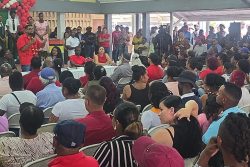Most of the continent’s leaders meet today, in Georgetown, at the 4th Regular Summit of Heads of State and Government of the Union of South American Nations (UNASUR). They do so ostensibly with the aim of strengthening regional integration and are expected, among other things, to discuss the search for a new secretary general and the adoption of a “Democratic Clause”, which will reportedly specify measures to be taken in instances when the constitutional order in member states is at risk. More significantly for Guyana, the Summit will also witness the passing of the chairman’s gavel from President Rafael Correa of Ecuador to President Bharrat Jagdeo.
The introduction of the “Democratic Clause” is an interesting development and seems to be an attempt to bolster the credentials of the continental grouping as a mechanism for political consensus and solving regional problems.
During the recent political crisis in Ecuador at the end of September, which could conceivably have seen President Correa’s government toppled as a result of what appeared to begin as an industrial relations grievance on the part of the national police force, President Hugo Chávez of Venezuela stated that the matter would be better dealt with by UNASUR rather than by the Organization of American States (OAS), of which all of UNASUR are also members. This notwithstanding, the OAS met immediately and stated its unanimous support for the government, condemning any attempt to disrupt the democratic process in Ecuador. The OAS secretary general was also quick to visit Ecuador and spoke out strongly against what he and many in the hemisphere consider to have been an attempted coup. Such steps are important in sending a strong signal that coups will not be tolerated.
The OAS, founded in 1948, even though hampered by ideological differences among certain of its members and considered by some to be a tool of the USA, has, through its Inter-American Democratic Charter, unanimously adopted in 2001, the institutional capacity and authority granted by international law to take action in the face of threats to democracy in its member states. UNASUR, on the other hand, is barely two and a half years old and is, at this early stage, little more than a mechanism for political consultation. In this context, it will be interesting to see what the communiqué emanating from today’s Summit offers beyond a reiteration of the position already taken by the very countries at the OAS.
As the rotating chairmanship passes to Guyana and as this country assumes responsibility for coordinating the UNASUR agenda through a pro tempore secretariat, it will also be interesting to note what measures are taken aimed at the institutional strengthening of the body. One rather suspects that very little can be done in this respect, for Latin America and the Caribbean are increasingly being burdened by a proliferation of regional entities of a similar nature, with almost identical objectives and with overlapping memberships.
Most notably, there is the Rio Group, which comprises the 12 countries of UNASUR, the six Central American republics, Mexico, Cuba and the Dominican Republic; and the embryonic Community of Latin American and Caribbean States, announced in Cancún, Mexico, in February, which is made up of these same countries plus CARICOM. And then, of course, there is the much older OAS, which includes Canada and the USA but from which Cuba and Honduras are currently absent.
If UNASUR is to fulfil its ambitious objectives aimed at “a unified South America”, it will have, at some point, to strengthen its institutional framework, even if at the risk of duplicating what other organisations already do. It is difficult, however, to contemplate President Jagdeo, even as incoming chairman, committing resources to such a path, much less strengthening the Foreign Ministry in such a way as to manage the UNASUR process to maximise the benefits to Guyana over the coming year.
Notwithstanding Brazil’s leadership, under President Lula da Silva, in advancing new forums for regional dialogue, cooperation and integration, and in spite of the desire by some Latin American and Caribbean countries to explore alternatives for forging their own destiny free from US influence, there does not seem to be the appetite for establishing new, onerous bureaucracies that would require significant diversions of human and financial resources. The situation becomes all the more challenging with a small country like Guyana at the helm.
Amidst all the hype and hoopla surrounding the UNASUR Summit and the platitudes about “continental solidarity”, it is still unclear what exactly will be achieved today, especially from a national perspective. Indeed, if one were to look back to Guyana’s hosting of the 19th Summit of the Rio Group in March 2007 and this country’s year in the chair of that body, one would be hard pressed to identify the precise benefits gained from that experience, beyond the intangibles of political goodwill and a closer relationship with President Lula and Brazil.
We hear, almost ad nauseam, talk of our “continental destiny” and Guyana’s role as a bridge between Latin America and the Caribbean. It could be that the somewhat higher continental profile of Guyana and President Jagdeo over the past few years might have contributed in part to the honour of Guyana hosting this Summit and assuming the chair, and to the heightened possibilities for infrastructural integration with our neighbours. Perhaps, however, the country would be better served if the Government could provide Parliament and the people with regular updates on what Guyana has achieved and foment serious discussion on the means to achieve more, in terms of our strategic positioning between Latin America and the Caribbean.








